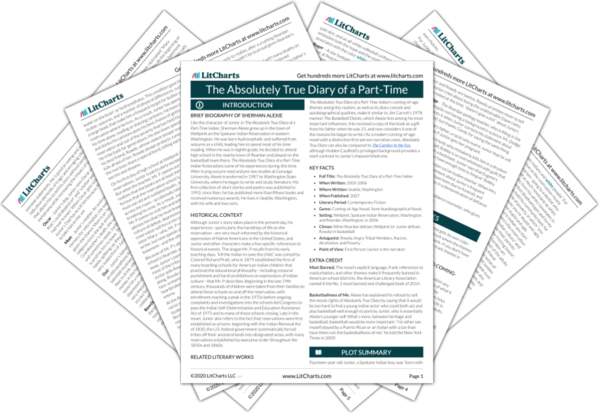Summary
Analysis
Having broken Mr. P’s nose, Junior is suspended from school. It’s the first time he’s really been in trouble, and his family is very disappointed in him. After a week, Mr. P comes to see him and unexpectedly apologizes for the suspension.
Junior’s family’s reaction to the suspension demonstrates his role at school and in his family. Unlike Rowdy and Mary, Junior follows the rules, and people have higher expectations of him than he knows. Junior feels guilty for his actions, which is why Mr. P’s apology is so surprising.
Themes
Junior is “freaked out” by Mr. P’s questions about why he threw the book, and frightened when the teacher says what he did was almost unforgivable whether he intended to do it or not. However, Mr. P tells Junior he forgives him.
This is the novel’s first example of the power of forgiveness. Mr. P’s forgiveness is even more meaningful because Junior hasn’t necessarily earned it. It’s also important for Junior’s future, since continuing to punish him—if Mr. P had sought revenge—could sour Junior’s attitude toward school, and hurt his potential to fulfill his dreams.
Themes
Mr. P explains that as a young teacher at the reservation school, he was part of an education system intended to kill Indian culture. He can’t apologize to the people he hurt—both psychologically, and physically by beating kids who didn’t conform—but he can apologize to Junior. Junior realizes that he is listening to a confession.
As it turns out, though, Mr. P’s forgiveness is itself a form of atonement. Through forgiving Junior, he is trying to find a way to forgive himself. Mr. P has realized his part in a harmful, racist system that kept Indians down, and sees helping Junior succeed as a way of undoing some of the damage.
Themes
Mr. P reveals to Junior that Mary used to want to be a writer; before she gave up on her dream, she was working on a romance novel like the ones she liked to read. Junior is saddened, and surprises himself by saying she might still have a chance to change her life (in fact, he believes, “you don’t get to change your life, period”).
Writing, like drawing, is a way of constructing imaginary worlds, so it’s fitting that both Junior’s and Mary’s dreams involve transforming fantasy into reality. Junior’s comment about Mary changing her life shows the beginning of a transformation in his beliefs about what is possible for him and for other Indians.
Themes
Get the entire Diary of a Part-Time Indian LitChart as a printable PDF.

Mr. P doesn’t want Junior to give up like his sister did. In an emotional speech, he tells Junior that he deserves better than the culture of defeat on the reservation, and makes him promise to leave the reservation before reservation life kills his hope and his ability to fight. Instead, Mr. P says, Junior must “take your hope and go somewhere where other people have hope”—or as Junior puts it, “multiply hope by hope”—which means going as far away as possible from the reservation.
As Mr. P’s speech makes clear, achievement isn’t just about people’s individual qualities—it also has a lot to do with their surroundings, the opportunities available to them, and what the people around them expect. This falls in line with Junior’s earlier statement that poverty only teaches you how to be poor, and (perhaps ironically) with the communitarian values he identifies as one of the best parts of his Indian heritage.
Themes












